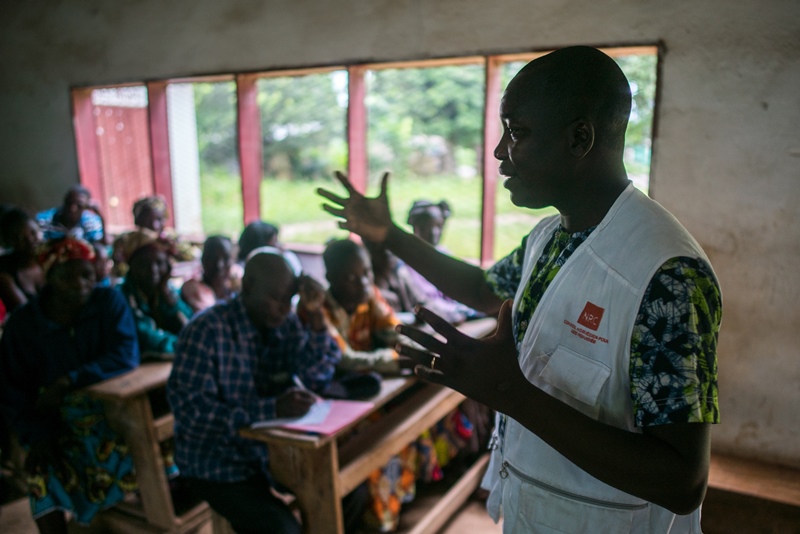BANGUI, Central African Republic – Eight months after Muslim rebels took over her town in the northern Central African Republic, Leonie Toumbanze is still waiting to go home.
The 35-year-old single mother of two fled Kaga-Bandoro in December to the capital Bangui. “The armed groups kill everyone,” she said. “We weren’t safe.”
She now lives in a small house near the airport and sells homemade alcohol to pay the $10 per month rent. More than 180 miles (300km) away, the rebels live in her house.
Fighting between militias continues to bedevil the impoverished Central African Republic, despite numerous attempts at peace since Muslim and Christian armed groups engulfed the country in violence in 2013.
Conflict has displaced some 600,000 people inside the country – a number that has risen by 40 percent since last year.
For them to return home one day is complicated not just by ongoing violence but also by another legacy of weak government control – outdated land laws dating back to 1899.
Nationwide, only about 1 percent of homeowners in Central African Republic have government-issued land titles.
Toumbanze left behind everything when she fled to Bangui, including the certificate of sale for her home. Even if that paper is recovered, she likely faces a protracted legal battle to reclaim her home.
An Alternative to the Courts
With the judicial system not functioning in many parts of the country, court processes can be lengthy, sometimes taking years to resolve, said Audrey Koursane, a lawyer working for the Norwegian Refugee Council’s (NRC) information, counseling and legal assistance program in the Central African Republic.
It’s also too expensive for most displaced people to fight their case in court.
So NRC holds information sessions to inform Central Africans of their legal rights regarding housing, land and property and then helps mediate disputes over ownership. They also train authorities about their responsibilities in managing abandoned and occupied homes.
Toumbanze recently attended an NRC session in her new neighborhood in Bangui. Sitting in a school classroom, she and about 30 other men and women listened to NRC’s Jophiel Issine explain their rights, speaking loudly to be heard above the rain pounding on the building’s tin roof.
“I’ll go back if it gets calm again,” Toumbanze said. “I would like peace to come back, to live together with our brothers [of both Muslim and Christian faith].”

The Norwegian Refugee Council’s Jophiel Issine explains land rights to displaced Central Africans during a recent workshop. (Zack Baddorf)
Issine holds several similar sessions each week and also helps mediate disputes. “Mediation is very easy. There are no costs,” Issine said.
The NRC is currently assisting with about 480 mediations over the occupation, destruction and sale of homes throughout the country. So far, only about 20 cases have been resolved.
‘We Want to Go Back’
There is little data collection in Central African Republic, so the total number of occupied homes is unknown. Yet the problem appears widespread. For example, every one of the 807 homes in Carnot, a city in the west of the country, is now occupied by people who don’t own them, according to NRC.
Mustafa Tati lived in the Foulbe neighborhood in Bangui before he and hundreds of other Muslims fled to Chad in January 2014 after being threatened by Christians armed with machetes and rifles.
He has since returned to the predominantly Muslim neighborhood of PK5 in Bangui, and is working with the NRC to help mediate his return to his home. An estimated 280 homes are being disputed in Foulbe.
“We left just to save our skin,” Tati said. “And now we are back. It is our land. We want to go back to our area.”
Tati, a licensed lawyer and previously the head of his neighborhood’s cattle market, has the land title and the survey for his home and property, but while he was displaced another neighborhood chief illegally sold his land and the land of the other refugees.
“Nobody is there,” Tati said. “Only the Christians stayed there.”
He said it’s not safe for Muslims to return to Foulbe because there are no U.N. peacekeepers or Central African Republic army forces in the area.
Reconstruction and Returns
In some areas of Central African Republic, communities have been entirely razed during the fighting, and organizations like NRC and others are focusing on rebuilding rather than restoring ownership.
Lucien Serago, 64, the assistant village chief of the Damala neighborhood near the airport in Bangui, attended the same workshop as Toumbanze. While he appreciated learning about the legal aspects of reclaiming property, he noted that many homes are no longer habitable.
“The people have been plundered,” said Serago, who was displaced during the conflict and returned to find his home destroyed. “They have practically nothing. They are destitute. They do not have the financial means to go and rebuild their house to live there.”
“Who will rebuild the houses? That is the problem,” he said.
In Sibut, north of Bangui in the Kemo prefecture, most houses are still standing but members of the Christian majority population have taken over the land of displaced families.
“It’s very sensitive and difficult to talk about returnees coming back there,” said Kerry McBroom, a program development manager for the NRC’s information, counseling and legal assistance program. “People see the returnees as the perpetrators of violence and feel as if they’re owed something as a result of that, which a lot of times could be the property or the piece of land.”
Yet, she says, returns are essential to the country’s future. The inability of people to return to a home is “a huge part of what fuels a lack of social cohesion, lack of access to economic opportunity, lack of stability and access to education,” according to McBroom.
“If you don’t have a place to be where you feel welcome, it’s really impossible to access the rest of your rights,” she said.
